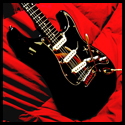|
Holy poo poo that pinky
|
|
|
|

|
| # ? Apr 23, 2024 14:57 |
|
My classical guitar instructor taught me a very simple and useful trick for barres the other day: Just use the weight of your arm to hold the barre. Try fretting only the lowest note, using the barre finger as a pivot point, swinging your arm up and down so you can feel the point where your arm is using your finger to pull the strings towards the fretboard. Then barre the other strings once you have used this pivot/swinging method to find the weight of your arm. It should take a good deal of tension out of your wrist if you do it right.
|
|
|
|
Another barre chord tip: use the side of your finger and not the fleshy part. Try to rotate your towards the headstock (counter-clockwise for righties). I find that using the fleshier part of your finger can often result in muted strings, which probably isn't what you're looking for most of the time.
|
|
|
|
baka kaba posted:I'm no shredder but guitarists tend to use the one-finger-per-fret technique, where you have your hand in one position (say index finger over the 5th fret) and your fingers cover a box of four frets, with each finger responsible for the notes on the fret it covers. There's more to it than that (you can sometimes stretch, you might need to play more than one note at once, and if you're moving position it might make sense to fret a note with a different finger) but that's the basic idea. I had my first lesson yesterday, and one thing I learned was pretty much exactly this. I don't know why it never occurred to me before, but I can already see how it will help me tremendously. It's such a stupidly simple concept. I feel like I've been wearing my shoes on the wrong feet for years. My index and middle finger have been doing WAY more work than they have to, and I was just never able to figure out a way of training up my ring and pinky. I guess playing scales across all six strings using only four frets was just too complicated an exercise for me to come up with on my own. I really can't believe how big my blind spots were. Any my instructor is definitely legit. Even from one short hour I could tell the guy has forgotten more theory than I know, and has the technique to use it. I'm pretty psyched to learn more!
|
|
|
|
I didn't see a bass specific thread so I thought I would post this here. I need another hobby and I have friends that play guitar, so I thought 'Why not learn some bass and we can gently caress around in the basement'. So I need some advice on a good starter bass and amp. If I practice a lot and don't suck, I'll buy something nice in the future. I haven't set on a price range, so if you have something that worked well for you throw it out. If it matters, my interest is in classic rock, blues, punk, and lots of metal.
|
|
|
|
dross eater posted:I didn't see a bass specific thread so I thought I would post this here. Check out this thread for Bass http://forums.somethingawful.com/showthread.php?threadid=2710675
|
|
|
|
amishpurple posted:Check out this thread for Bass http://forums.somethingawful.com/showthread.php?threadid=2710675 Thanks!
|
|
|
|
So I've been using my acoustic and my rondo AL-2000 back and forth. I found I preferred the acoustic, but didnt know why (new to this and whatnot). I really, really preferred the acoustic. Then I tried my guitar teacher's Gibson SG with 13s on it. I loving LOVED the feel of the 13s. Am I insane for wanting to put 13s on my agile? She said she'll teach me setup next lesson if I'd like. So I am thinking why the gently caress not?
|
|
|
|
Walked posted:So I've been using my acoustic and my rondo AL-2000 back and forth. If you liked the acoustic and like the feel of thick strings, then play acoustic. Electric guitar technique doesn't lend itself well to extremely thick strings (except jazz), and trying to use that technique as a beginner could be physically difficult. 13s are really unusual for electrics and I'd be curious what she needs them for. I think acoustic guitars are easier to get sounding nice when your hands aren't too steady. With the electric everything is amplified and compressed, so small sounds get through more clearly than on an acoustic. Thick strings also make your fingers feel like they're on more solid ground, as it's much harder to bend a single note in a chord out of tune. There's really no reason not to learn on both an electric and acoustic, since they do diverge technically and being really proficient on one doesn't transfer to the other without some work.
|
|
|
|
Ok, I'm not exactly new to guitar but I figured this would be the best place to ask this question. I'm working on a song and I can't exactly figure out which key it is in and which other chords would work with what I've got so far. My song starts with Am - AmMAJ7 - Am7 - Fm - Am - E7 - Am. My guesses have been that it's either in the Key of C or A minor harmonic. Any suggestions on what other chords go well with the sound?
|
|
|
|
Scott Justice posted:Ok, I'm not exactly new to guitar but I figured this would be the best place to ask this question. I'm working on a song and I can't exactly figure out which key it is in and which other chords would work with what I've got so far. My song starts with Am - AmMAJ7 - Am7 - Fm - Am - E7 - Am. My guesses have been that it's either in the Key of C or A minor harmonic. Any suggestions on what other chords go well with the sound? anything "harmonic" only refers to a scale, not a key. Considering a harmonic minor and C as keys indicates you're over-"modalizing" things. Your song is in the key of Am, most definitely. The V i at the end is the strongest possible way to define the tonic. C isn't an option in this progression, because it doesn't make an appearance at all. Key is defined by the root of the tonic and nothing else. It's whatever note is the bottom of the ultimate chord of resolution. When determining key, the mode/scale is pretty much irrelevant except the M/m dinstction (but that's obvious enough when you hear it). What you should look for is root movement and where the progression starts and ends. Scales are defined by the notes you're using relative to the tonic at any particular moment. You'd use notes/arpeggios from A natural minor scale most of the time, but then use melodic or harmonic minor over the dominant, E7. The scale usually coincide with the key, but they in no way define each other. CalvinDooglas fucked around with this message at 00:48 on Sep 24, 2010 |
|
|
|
So I like Iron Maiden and I can play the rhythm parts to a lot of songs and I know the solo to Aces High now. Except the speed is loving killer in the solos when I have to jump around strings. I literally cannot pick faster enough to keep up. Is this just something I have to train hard at or should I become some sort of legato god?
|
|
|
|
Sylink posted:Is this just something I have to train hard at or should I become some sort of legato god? Picking's probably the most neglected part of anyone's practice routine, I neglected it for years.
|
|
|
|
Honestly, my alternate picking is great, I find its my fingers lagging behind.
|
|
|
|
Practicing your alternate picking is more about building coordination between your hands than it is about building actual speed. I mean, a lot of guitarists can tremolo pick pretty fast without a lot of practice, but being able to put the hands together is the hard part. One really common exercise is to practice 3 note per string scales with a metronome, starting slow and building speed gradually. Or just play chromatic scales all day. Or just isolate the fast passages in solos you want to learn and make those into exercises. The point is to get your pick hand and your fret hand to work together to play fast but also cleanly. A metronome is essential.
|
|
|
|
Any advice/sources for playing guitar and singing? Particularly for an ex-drummer, hahaha...  So I'm a good singer but still focus a lot on my breathing. I'm trying to add guitar to a few songs, and they're really pretty easy bits, which I can play fine on their own. But combining the two, my fingering goes wonky, my breathing off, my strumming seems like my arm has a mind of its own and my fingers just mash up into a jumble on the fretboard. I consulted a professional friend of mine who said simply "Learn one, then the other, then combine" loving great. I'm aware that chord changes take place during breaks in the vocals but I find myself running out of time when concentrating on everything. So, thoughts, advice, links are all welcome!
|
|
|
|
Clockwork Sputnik posted:Any advice/sources for playing guitar and singing? Particularly for an ex-drummer, hahaha...
|
|
|
|
Zo posted:I think your friend is right. You don't know the guitar part well enough if that's enough to make your fingering go wonky. I suppose, but I really do know the parts as well as one can. I can play them with my eyes closed essentially. And while I'd still consider myself a 'beginner' in terms of accumlulated knowledge, but I have been playing guitar on and off since I was 8. Sure, I'm coming out of a hiatus with guitar but my finger memory is good, as is my positioning, it's all automatic. I feel like the drummer part of me tries to take over my strumming when I'm singing, if that makes any sense?
|
|
|
|
Clockwork Sputnik posted:I suppose, but I really do know the parts as well as one can. I can play them with my eyes closed essentially. Eyes closed, or not even thinking about it? Some of the songs I know I can play while reading an article online or whatever, and I can just sing along whenever I want. Of course those are songs I've played countless times. There might be a more "efficient" way to go about it but his advice will definitely work.
|
|
|
|
Yeah, it can be good practice to play while you're watching tv/youtube/hulu, or reading the news, or whatever. You might still have to look down sometimes, depending on what your hands have to do, but that's not a big deal, imo. Then do the same with your singing and breathing and so on. You don't want your performance to be thoughtless, of course. But it shouldn't take constant, total attention. Pyrthas fucked around with this message at 20:09 on Sep 28, 2010 |
|
|
|
Clockwork Sputnik posted:I suppose, but I really do know the parts as well as one can. I can play them with my eyes closed essentially. Personally when I attempt to sing and play I tend to focus on one aspect (usually the singing since I suck) and I'm on autopilot for the other - this can shift around during a song if say there's a trickier guitar part or rhythm or whatever, but in general my hands get on with the guitar work on their own mostly. It's less about knowing the guitar parts and more about not having to think about them. That's how it works for me anyway
|
|
|
|
I'm having trouble doing partial barre chords. My hands are pretty large (Pinky to thumb is escape key to F11) so I always feel like my index finger is being bent crookedly. Any tips? I play a classical guitar so I am taking the bigger neck into account as well. I've been cheating all this time doing full barre chords  my hands are like made to fit a Classical Guitar. I ran into a song that used the open strings though so time to re-learn everything! my hands are like made to fit a Classical Guitar. I ran into a song that used the open strings though so time to re-learn everything!edit: It's like god designed my hands perfectly so that the first string goes under the joint of my finger when I barre 4 strings. God drat it. And if I barre 3, it just gets drat awkward. Thoren fucked around with this message at 02:01 on Oct 2, 2010 |
|
|
|
Coincidentally my hands also stretch from Esc - F11. When I tried them at first I had a lot of trouble with partial barres; trying to barre with my ring finger was especially pathetic. After stretching my hands out for a few days I can now barre clean. Practice. Your hands do NOT want to be playing guitar
|
|
|
|
And go slowly, and stretch beforehand. Take it easy and make sure you're playing CLEANLY.
|
|
|
|
chordate posted:Practice. Your hands do NOT want to be playing guitar My hands are big (Esc - F11) and I have wide fingers. I thought for the longest time I would never be able to play a barre chord properly. I can play barre chords. Keep practicing.
|
|
|
|
I'm pretty new to guitar and I'm looking to get a new amp. The one I've got at the moment is a cheap little Laney Hardcore Max 10, and I'm really looking for something with nicer sound, better volume, more effects and tones etc. I'm looking at the Vox VT-30 at the moment, which I can get for AUD$299. Anyone have any experience with this model? Or vox amps in general? I really, really like the looks of this from the youtube reviews I've seen (I'll listen to it in person before I make a final decision) but are there any other good amps at a similar price point I should look at? Here's a page which lists the specs of the VT30, written by a very excited man with a passion for the caps lock key: http://www.cranbournemusic.com.au/cstore/935042000133.html For reference, I've got a cheap, plain Cort electric guitar and plan to play a range of different styles (primarily classic rock, though). Also, for a near-beginner with a cheap, low quality amp and guitar, which is it better to upgrade first? My plan was to get this amp and stick with the cheap guitar, then at some point in the next couple of years get a really nice guitar like a stratocaster or something. Is this the right way to go about things?
|
|
|
|
Vox makes quality amps, I've been using a DA5 (the Microcube equivalent) and I could mess with the effects all day. Also loud as poo poo for 5 watts. I've tried their larger models and have no complaints. That said, if you're willing to spend around $300 try to find a used tube amp on craigslist. Fender Blues Jrs usually go for that much and they sound phenomenal. ex. NJ listing for $315 Upgrade your amp first because that's where your sound comes from. If your guitar's uncomfortable to play though you might want to replace that? chordate fucked around with this message at 15:48 on Oct 3, 2010 |
|
|
chordate posted:That said, if you're willing to spend around $300 try to find a used tube amp on craigslist. Fender Blues Jrs usually go for that much and they sound phenomenal. From his link I'm assuming he's in Australia in which case $300 is a great price for that amp. I paid over $400 for mine less than 6 months ago (thinking I was getting a great deal at the time) and don't regret it a bit. For bedroom playing there's not much that will beat it. While I can't speak for the accuracy of the models, it does just about everything and the power level control is a great feature for those who have to deal with grumpy neighbours (or spouses).
|
|
|
|
|
Thoren posted:edit: It's like god designed my hands perfectly so that the first string goes under the joint of my finger when I barre 4 strings. God drat it. And if I barre 3, it just gets drat awkward. Try rolling your index finger to the side, so you're barring more with the flatter edge of the finger than the bottom
|
|
|
|
CalvinDooglas posted:
Completely forgot I posted that. I realize how it came across, I wasn't talking about "6/8 triplets = jazz" or whatever. Rhythm was probably the wrong thing to focus on entirely. As an example, moving from (chords) I maj > IV maj > V maj or whatever combination is the blues cliche (fairly sure it's the standard progression?). I'm looking for anything of that nature. I am certain more of these exist and I am just terrible at explaining it.
|
|
|
|
chordate posted:
ii V I is the basic harmonic unit of jazz. Similar to how certain patterns like I IV I or I iii in classical and pop music can effectively be analyzed as I alone, the ii V I in jazz is almost a basic unit of tonality. Look for minor-dominant-major and half dim-dominant-minor patterns. The movement of ii V I circle of 5ths patterns is all over, even through key changes. This is getting into NO LONGER NEW territory, but Here's a good way to connect blues and jazz in this way: When you hear an upbeat blues song, you often hear a I IV on each chord. on the I you hear I IV back and forth and on the IV you hear IV bVII back and forth. Even though both the I and the IV contain two chords, you don't hear a progression, just a vamp on I and a vamp on IV. ii V I in jazz is used similarly. You'll hear a ii V I on the I, then a ii V I based on another key, and so on until it cycles to the dominant. As for rhythmic aspects of harmonic progression in jazz, look for changes every four bars. When you get comfortable with identifying ii V I patterns in keys outside the tonic, you'll start to see how the target "I" defines the tonality of a few bars at a time. Even though you're playing over individual chord changes, that final "I" (not necessarily tonic) is what your ear hears coming up. A jazz blues like "#1 Green Street" by Grant Green will help you understand by ear how jazz and blues differ in their treatment of tonicization. If you this doesn't make much sense, post the question in NO LONGER NEW and I or someone will give a more thorough explanation with examples. Understanding tonality in jazz is definitely beyond beginner stuff. Bear in mind it's also not entirely necessary to understand the "big picture" of a jazz tune right away. If you are technically and theoretically still a beginner, it's OK to understand a jazz song a few bars at a time. Macro-level analysis takes a while to get good at, even if you know the concepts already. What's most important is your ability to play the idea, even if you don't totally understand it. CalvinDooglas fucked around with this message at 02:25 on Oct 4, 2010 |
|
|
|
I have an anal-retentive correction to make to the otherwise good OP. At the bottom of the OP equal temperament tuning is mentioned. The method described has nothing to do with equal temperament, and actually, if correctly performed, will definitely result in deviations from it. Tuning theory (and temperament in particular) is frequently misunderstood, so I felt I should clear this up. Tuning by comparing the harmonics over the 5th and 7th frets (the 4th and 3rd partials) will ideally result in pure, pythagorean relationships between the strings, where consecutive strings (excepting between the G and B strings) are a perfect fourth away from each other, a 3:4 ratio apart, and approximately 498 cents. An equal tempered fourth is exactly 500cents. Thus, following the posted directions, you would (ideally) get an E string 2 cents sharp, an A string in tune, a D string 2 cents flat, a G string 4 cents flat, a B string 4 cents sharp, and an E string 2 cents sharp. The worst is the 408 cent major third between G and B, which is 8 cents sharp of equal temperament, and 22 cents sharp of just (pure) intonation. This is mostly not so bad, as 2 cents is bordering on inaudible in most circumstances, and 4 cents still isn't a big deal. That one major third sucks pretty bad though. In practice, the real problem with this method is that there is opportunity to compound error. For example, if you, say, tune the D string a little sharp, and the G string a little sharp, it can add up to a fairly substantial error. The ideal (aside from tuning each string to its own reference) is to tune all the strings to one string, preferably on fretted notes and octaves, as these should theoretically be accurately tempered. Thus, one could: Tune A to a pitch fork or other pitch reference Fret E string at fifth fret, compare to open A string Fret A string at fifth fret, compare D string to this Play 12th fret harmonic of A string, compare 2nd fret of A string to this Play 5th fret harmonic of A string, compare 10th fret of B string to this Play 5th fret harmonic of A string, compare 5th fret of high E to this Of course, guitars never intonate perfectly accurately, so anything you do is likely to need small corrections, which are best done by comparing various octaves on different parts of the guitar, if you'd like to be very accurate. One should not ever tune to chords because the 3rds in equal temperament are supposed to be off. And strings are subtly inharmonic, maybe throwing off some of those harmonics off very slightly. I don't even do the above proceedure. I tune quickly by harmonics, and make a few quick octave checks, if I'm not using an electronic tuner. This is all terribly nerdy, and I mostly just think the OP should just remove reference to equal temperament. cpach fucked around with this message at 04:19 on Oct 4, 2010 |
|
|
|
Clockwork Sputnik posted:Any advice/sources for playing guitar and singing? Particularly for an ex-drummer, hahaha... What I focus on is the beat. The beat drives what I do with my hands, when I need to hit the chords and what my strumming hand is doing. This becomes something you can do pretty mindlessly after spending enough time playing along with other people or albums. When I sing along to my playing, it's a matter of tying the vocals to the beat as well. So rather than trying to have the guitar drive your vocals or vice versa (which sounds like what you are trying to do by working chord changes around the vocals) it's more a matter having the beat drive both the vocals and the guitar. So do a lot of active listening, clap hands and sing along. Get a handle on which chord in the progression and which beat in the bar the lines of the verse start on and so on.
|
|
|
|
 They sold out of both the Vox VT30 and the VT50. The guy in the shop suggested an amp made by Nux, who I've never heard of. From researching a bit more online, I see there's a Behringer Virtube VT50FX for a similar price at a store near me. It seems similar in terms of features, is this a good option? I can't find anywhere near the number of reviews or demonstrations. Any thoughts or comments on Behringer as a brand? Or this particular model of amp? They sold out of both the Vox VT30 and the VT50. The guy in the shop suggested an amp made by Nux, who I've never heard of. From researching a bit more online, I see there's a Behringer Virtube VT50FX for a similar price at a store near me. It seems similar in terms of features, is this a good option? I can't find anywhere near the number of reviews or demonstrations. Any thoughts or comments on Behringer as a brand? Or this particular model of amp? Thanks for the replies to my first post, and yes I am in Melbourne, Australia. The Geoff fucked around with this message at 10:08 on Oct 4, 2010 |
|
|
|
cpach posted:I have an anal-retentive correction to make to the otherwise good OP. I don't know why tuning temperament would even be relevant to beginners. It's hardly relevant to professionals.
|
|
|
|
I'm getting my first guitar this weekend. My uncle got it a year or so ago and barely played it, so now I get to have it! Woo freebies. Anyway, all I know about it is that it's electric, and it's been sitting in its case for a year, roughly. Is that a bad thing? What kind of stuff should I expect to have to fix besides getting new strings, if anything?
|
|
|
|
Dickeye posted:I'm getting my first guitar this weekend. My uncle got it a year or so ago and barely played it, so now I get to have it! Woo freebies. Dust that baby off, string it, and plug it in! Have fun sucking for a few months 
|
|
|
|
Thoren posted:Dust that baby off, string it, and plug it in! Have fun sucking for a few months Woo! So loving pumped for Saturday! I'll take pics once I actually have the thing.
|
|
|
|
CalvinDooglas posted:I don't know why tuning temperament would even be relevant to beginners. It's hardly relevant to professionals. It isn't. It's my own weird subspecialty interest, but I'd prefer if people didn't mix up a topic that's already commonly misunderstood. I think the OP should just delete all reference to temperament and it'll be golden. Teaching beginners the importance of getting their instruments reasonably in tune is super important, though. When I was starting, I quit a group classical guitar class because the class couldn't get their drat instruments in tune. Instead I joined the intermediate class, despite my inability to read. I just practiced like crazy for a while to catch up (I already knew open chords and stuff). It drives me insane to hear out of tune guitars, because really it's an easily preventable, mechanical problem that dramatically effects whether you are painful to listen to. cpach fucked around with this message at 11:47 on Oct 5, 2010 |
|
|
|

|
| # ? Apr 23, 2024 14:57 |
|
Man, I really had no idea how very, very, very, VERY under-educated I was about guitar and music in general until the lessons began. Ten years and I'm currently working on modes, triads, four part chords (playing the notes through various modes, like playing i iii v vii for all the notes in a given scale, not learning what a C7 is for the first time), and basic some pretty basic fingering technique. And it's actually hard. It's REALLY helping though. A month ago I wouldn't have known a dorian mode from a phrygian mode from my rear end in a top hat, but now I do. A month ago if someone had asked me to jam over an Am7 - D9 I wouldn't have had a loving clue what to do. Granted, I still suck at improvising, but I suck surprisingly less than I did a month ago. And I'm still in a bit of shock about how difficult I find it considering what a basic idea it is. Play notes that don't sound awful against two chords. Boy, that's a real toughy! I'd be embarrassed if I wasn't so happy that I'm finally able to do this poo poo. I wish I had done this when I first picked up the guitar. This is exactly what I wanted out of lessons. My fingering is improving, my improvisational skills are improving, my music theory is improving, and the best party is I can actually see how it all fits together and I get how it's all building a foundation upon which I'll be able to grow into a solid player. It's very exciting. man thats gross fucked around with this message at 19:16 on Oct 5, 2010 |
|
|

























